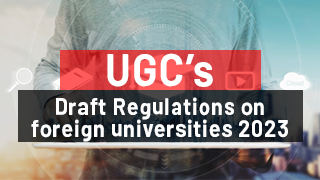UGC’s Draft Regulations on Foreign Universities -2023
Recently, the University Grants Commission (UGC) released draft regulations to allow foreign universities to enter India.
Key Points
- Eligibility Criteria:
- The UGC draft regulations-2023 have “top 500 foreign universities” and the ranking will be decided by the UGC “from time to time”.
- In NEP-2020, only the top-100 QS ranking universities could establish their branch campuses in India to provide quality higher education to Indian students who aspire to gain foreign degrees.
- Apart from it if not in top 500, the applicant should be a reputed institution in its home jurisdiction”.
- Fee Structure:
- Foreign higher educational institutions to decide a fee structure that is “transparent and reasonable”.
- Also free to decide “qualifications, salary structure, and other conditions of service for appointing faculty and staff”.
- Physical Infrastructure:
- It states that “The Foreign Higher Educational Institutions should arrange for adequate physical infrastructure”.
- No Equivalence Requirement:
- All Indian students with foreign degrees are required to get an equivalence certificate from the Association of Indian Universities.
- The draft regulations-2023 waive off equivalence requirement for the degrees granted by the foreign branch campuses in India.
- Safeguards for Indian Students:
- The draft states that the UGC will have the right to inspect the campuses at any time.
- Campuses will not be outside the purview of anti-ragging and other criminal laws.
- Repatriation of Profits:
- The draft regulations-2023 allow for smooth repatriation of profits earned by the foreign branch campuses under the rules and regulations of the Foreign Exchange Management Act (FEMA) 1999.
- The draft regulations also require the foreign universities to submit audit reports and annual reports to the UGC “certifying that [their] operations…in India are in compliance with FEMA 1999” and other relevant government policies.
- Restrictive Instructions:
- Shall not offer any such programme of study which jeopardises the national interest of India or the standards of higher education in India.
- The operations shall not be contrary to the sovereignty and integrity of India, the security of the State, friendly relations with foreign States, public order, decency, or morality.
- The UGC shall impose a penalty and/ or suspend/ withdraw its approval at any time if the university’s “activities or academic programmes are against the interest of India”.
Significance of Draft Regulations
- Promoting the National Education Policy (NEP), 2020’ Vision:
- Internationalisation of Indian higher education is necessary to meet the objectives of National Education Policy 2020 which states that “top universities in the world will be facilitated to operate in India”.
- Freedom to Foreign Universities:
- The foreign universities will have full freedom to decide the fee structure and admission criteria for both Indian and overseas students.
- They will also get a free hand in hiring faculty, either from India or abroad, and will not be expected to mandatorily follow reservation policies in admissions and employment.
Challenges/ Issues with Draft Regulations
- Issue of Accessibility:
- The draft guidelines gives foreign branch campuses in India an upper hand in deciding different fees for different programmes.
- As a result, programmes with higher market value would be more expensive and not accessible to many students.
- Investment on Infrastructure:
- The provision for physical infrastructure would be problematic for foreign higher education institutions reluctant to go for major infrastructural investment and many would prefer to wait and watch for others to take the initiative.
- Restrictions on Faculty Members:
- The foreign faculty members may find it difficult to balance state policies, sensibilities and laissez-faire intellectual standpoint.
- In days to come, this is going to be a major issue in the process of knowledge creation and transaction in India.
- Vague Criteria for Reputation:
- It is not clear how the UGC would determine the reputation of such foreign universities that do not appear in any world rankings but are considered “reputed” in their home country.
- Determining Need for Scholarship:
- Although there is a provision for “full or partial need-based scholarships” to be provided by the FHEI (foreign higher educational institution) from funds such as endowment funds, alumni donations, tuition revenues, and other sources, determining “need” will be a challenging task.
Way Ahead
- India is a young nation with an increasing need for higher education and an ever-increasing demand for foreign degrees.
- As committed in NEP-2020, India should cater to the needs of a large section of Indian society termed “Socio-Economically Disadvantaged Groups-SEDGs” that include women, transgenders, SCs, STs, OBCs, EWS, differently abled, migrants and geographically disadvantaged groups.
- India should provide physical infrastructure to facilitate its strategy of internationalization of higher education.
- The guidelines should not open floodgates for such foreign educational institutions whose sole objective is to only earn profit.
